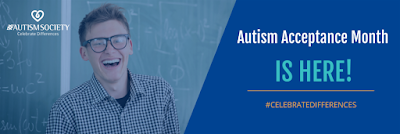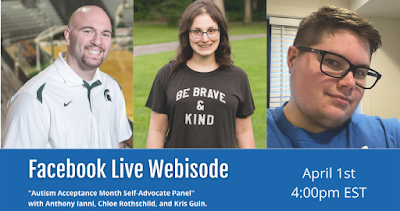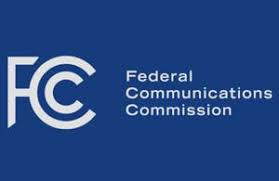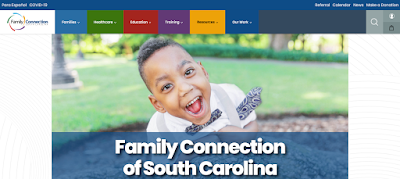Welcome to the Center for Disability Resources Library Blog! Here we will welcome your comments and suggestions about books and videos that you have borrowed, materials that you would like to see purchased, or anything involving the day-to-day operations of the library or even of disabilities in general. Visit the CDR Library's web site!
Friday, April 02, 2021
Free Assistive Technology Webinars
Thursday, April 01, 2021
#CelebrateDifferences for Autism Acceptance Month 👏
Today, the Autism Society of America kicks-off Autism Acceptance Month, and our mission to #CelebrateDifferences as we work to build an inclusive society where individuals with autism live fully through connection and acceptance.
While April is typically referred to as Autism Awareness Month, the Autism Society network and partners have been tirelessly advocating to lawmakers to federally designate April as Autism Acceptance Month. We applaud our 75 affiliates who are successfully advocating for proclamations at the state level, and have already seen wins in Louisiana, Michigan, Nebraska, Hawaii, Ohio and Kentucky, just to name a few!
Awareness leads to acceptance, which ignites change across our quest for equitable human rights in healthcare, employment, housing, and much needed supports and services.
With your help we not only #CelebrateDifferences, but acknowledge and accept the autism community’s differences to adapt, accommodate, and ignite change.
Triple Your Impact Thanks to
Make Waves Family Foundation
Thanks to our matching partner, Make Waves Family Foundation, your donation will be TRIPLED for new and increased giving now through April 8th. If you are a new donor, your gift will be tripled. Gave $20 last time? Bump it to $25, and Make Waves will give $75. Make the most impact by donating today to help us reach our $200,000 goal for Autism Acceptance Month.
Attend Our Autism Acceptance Month
Self-Advocate Panel
Join our Facebook Live episode featuring autistic self advocates today at 4pm EST, with Anthony Ianni, Chloe Rothschild and Kris Guin, who will discuss the importance of acceptance, and how we can build a more inclusive society.
Wednesday, March 31, 2021
Join us & the cast of 'Everything's Gonna Be Okay'!
Attend our FREE Virtual Panel with the Cast of 'Everything's Gonna Be Okay'
Join us on World Autism Acceptance Day next Friday, April 2nd at 5pm EST, streaming on Facebook with the cast of Freeform's "Everything’s Gonna Be Okay.” Josh Thomas, Kayla Cromer, Maeve Press, Adam Faison, and Lillian Carrier will discuss how they celebrate differences for Autism Acceptance Month, and dish on their characters and future episodes. The cast will also offer a sneak peek into Season 2, which will air on Thursday, April 8th. Don't miss out, click to attend below!
With your help, we hope to raise $200,000 to provide our community with information, resources, social stories, support and continued advocacy throughout the pandemic. Your support will make all the difference in the lives of so many people in the autism community.
Don't wait until April, start today! We encourage you to participate in fundraising efforts by setting up your own peer-to-peer fundraiser or Facebook fundraiser for the Autism Society.
Our Promise During COVID-19: The Autism Society of America promises to remain committed to improving the lives of all affected by autism across the spectrum and throughout the lifespan, and will focus on providing information, resources, and advocacy efforts to address these urgent needs.
Friday, March 26, 2021
Our priorities for Advocacy Day 2021
Advocacy Day is an opportunity for the disability community and our allies in South Carolina to come together, learn from each other, build excitement, and work to advance disability rights in our state. Will you join us online for Advocacy Day this year?
Register for Advocacy Day to receive updates via email and the link to join the livestream!
Here's what we'll be focusing on at Advocacy Day this year:
Community Based Services
Individuals with disabilities have been among the most significantly impacted by COVID-19, with over 1 in 3 COVID-related deaths in South Carolina coming from patients in institutions or their caregivers. To prevent further loss, South Carolina must work toward prioritizing community-based services over institutionalization.
In South Carolina, nursing homes and other long-term care facilities have become dangerous hotspots for COVID-19 outbreaks. Over 1 in 3 COVID-related deaths in South Carolina are patients in institutions or their caregivers.
- Unlocking the Barrier: South Carolina needs to allocate and increase funding for home and community based services (HCBS), such as Money Follows the Person, so that more individuals with disabilities can transition out of congregate settings and into the community successfully, with necessary support.
All states are mandated to create an Olmstead Plan which would establish how the state is going to provide services to individuals with disabilities living in the community, in accordance with the The U.S. Supreme Court Olmstead Decision of 1999. 21 years later, South Carolina still has not developed an Olmstead Plan, and now 40% of COVID-related deaths come from patients and caregivers in long-term facilities.
- Unlocking the Barrier: South Carolina must create an Olmstead Plan which would detail how the state will provide services to individuals with disabilities living in the community as the preferred option, as in accordance with the law.
Employment
Since the COVID-19 pandemic hit South Carolina in March 2020, people with disabilities have become 40% more likely to face unemployment than their non-disabled peers. While we rebuild our post-COVID economy and workforce, we MUST intentionally include people with disabilities in this process.
The State of South Carolina is missing a vital opportunity to become a model employer for people with and without disabilities. Job loss due to the COVID-19 pandemic is more likely for people with disabilities than the general population. According to U.S. Bureau of Labor Statistics, 1 in 5 workers with disabilities were laid off since March, compared to 1 in 7 of the general population.
- Unlocking the Barrier: Efforts such as Employment First are significantly needed to develop strong public policy at the state level, to systematically address the barriers that are preventing South Carolinians from being employed, and to provide incentive for businesses to maintain an inclusive workforce.
Over 1,200 South Carolinians with disabilities are limited to “work activity centers” or sheltered workshop settings, where less than 5% transition into community-based employment and they may make less than one dollar per hour.
- Unlocking the Barrier: Subminimum wage should be phased out and transition into supports for competitive, community-based employment.
Transportation
Transportation is the key to independence and community participation. People with disabilities are twice as likely to have inadequate transportation, making it difficult to take advantage of economic and recreational opportunities available to the community.
Many environmental barriers, like crumbling sidewalks, missing curb cuts, shelter areas, and hard to read signs may deny access to multi-modal transportation.
- Unlocking the Barrier: Investments in infrastructure must embrace Complete Street standards that meet the needs of pedestrians and riders of public transit.
There are 27 Public Transit Authorities across South Carolina, but efforts to inform the community about their services are often lacking and inconsistent.
- Unlocking the Barrier: South Carolina needs new resources to fund local outreach campaigns for all Public Transit Authorities.
With routes and services changing due to the pandemic and natural disasters, it is more important than ever that this information is communicated online in a clear and accessible format. Currently, people with disabilities in South Carolina are struggling to find and understand the latest information about public transportation.
- Unlocking the Barrier: All public transit authorities in South Carolina need to implement online accessibility practices so that their communications are accessible and understandable. PTAs should utilize available trainings if unsure how to make online content accessible.
Additional Information on Public Transit Authorities Across SC: https://www.scdot.org/travel/travel-transitproviders.aspx
ADA Coordinators
All SC state agencies with 50 or more employees must have Americans with Disabilities Act (ADA) coordinators to enforce the ADA and ensure that people with disabilities can access services equally. Without these ADA coordinators, accessibility slips through the cracks and people with disabilities are unable to participate equally in society.
The majority of state agencies in South Carolina do not have ADA Coordinators, as is required by law. The short list of agencies that do have ADA coordinators can be found on the SC SILC website – only 8 total.
- Unlocking the Barrier: When the SC General Assembly is conducting oversight of state agencies, this must include oversight of the agency’s ADA procedures and processes.
Even when agencies do have ADA coordinators, these coordinators are often not trained or knowledgeable on accessibility on the American with Disabilities Act. Coordinators must be properly trained and qualified in order to effectively advocate for the disability community.
- Unlocking the Barrier: The General Assembly needs to hold agencies accountable for having ADA coordinators who are qualified.
Thursday, March 25, 2021
FCC Releases Report and Order for Emergency Broadband Benefit Program
On February 26, 2021, the FCC released a Report and Order that established the Emergency Broadband Benefit Program, a $3.2 billion federal initiative to help lower the cost of high-speed internet for eligible households during the ongoing COVID-19 pandemic. The program will provide two benefits: a discount of up to $50 per month toward broadband services for eligible households (and up to $75 per month for households on Tribal lands), and a one-time discount of up to $100 for a laptop, desktop computer, or tablet purchased through a participating provider if the household contributes $10-$50 toward the purchase price. The FCC expects that purchased devices will “be accessible to and usable by people with disabilities.” The FCC expects that the program will be open to eligible households by the end of April.
Links to the Fact Sheet
- URL: https://www.fcc.gov/document/fcc-emergency-broadband-benefit-program-fact-sheet
- Word: https://docs.fcc.gov/public/attachments/DOC-370355A1.docx
- PDF: https://docs.fcc.gov/public/attachments/DOC-370355A1.pdf
- Text: https://docs.fcc.gov/public/attachments/DOC-370355A1.txt
Links to the Report and Order:
- URL: https://www.fcc.gov/document/fcc-adopts-report-and-order-emergency-broadband-benefit-program-0
- Word: https://docs.fcc.gov/public/attachments/FCC-21-29A1.docx
- PDF: https://docs.fcc.gov/public/attachments/FCC-21-29A1.pdf
- Text: https://docs.fcc.gov/public/attachments/FCC-21-29A1.txt
For general information on the Emergency Broadband Benefit Program, visit: https://www.fcc.gov/emergency-broadband-benefit-program. For further information, please contact Eric Wu, Attorney Advisor, Telecommunications Access Policy Division, Wireline Competition Bureau at (202) 418-1543 or by email at Eric.Wu@fcc.gov. Individuals who use videophones and are fluent in American Sign Language (ASL) may call the FCC’s ASL Consumer Support Line at (844) 432-2275 (videophone).
Wednesday, March 24, 2021
Calling all parents of children with disabilities
Tuesday, March 23, 2021
Visit our Updated Website!
Monday, March 22, 2021
Support Your Young Adult in Employment!
Are you a parent or caregiver of a
young adult with a disability?
Then you know that you have an important role in supporting their transition to adulthood. Join us for this free, 3-part webinar series to help raise you and your family's expectations for your young adult's future in employment. A real job in the community is possible for your loved one. This webinar series will empower you and your family with information on how to support that goal.
We will be offering live webinars from 6:30-7:45 PM on April 14, 21, and 28. We will also be airing the recording the day after.
Check out the topics below and register for any and all that interest you!
Defining a Good Life: Work is PossibleApril 14, 2021 6:30 - 7:45PM
Exploring Career Options: Where Do They Want to Work?
April 21, 2021 6:30 - 7:45PM
Preparing to Work: Building Skills and Matching to Job Tasks
April 28, 2021 6:30 - 7:45PM
Register for all webinars here!
Questions?
Please email us at hiremesc@able-sc.org
Thursday, March 18, 2021
Learn to advocate for your health!
- Do you want to learn how to discuss your disability with doctors and nurses?
- Do you want to learn how to speak up for yourself in a doctor's appointment or hospital visit?
- Or are you wanting to learn ways to stay healthy and well during the pandemic?
Take our Health Advocacy Consumer Classes!
We will teach you about:
- healthy eating
- stress management
- how to communicate with healthcare providers
Wednesday, March 17, 2021
How can we improve our volunteer programs?
We want to improve our volunteer programs here at Able SC.
Will you take a moment and let us know what areas we should focus on,
and what motivates you to volunteer?
Able South Carolina
720 Gracern Road Suite 106
Columbia, South Carolina 29210
803.779.5121 | advocacy@able-sc.org
Tuesday, March 16, 2021
2021 AAIDD Virtual Meeting: Registration is Now Open!
Promising Trends in Policy, Practice, and Research
AAIDD’s 145th Annual Meeting, Addressing Workforce Challenges: Promising Trends in Policy, Practice, and Research, June 21-24, 2021 is really the “must attend” meeting of the year!
Join us for our first fully virtual conference. Enjoy informative and inspiring plenary sessions, cutting edge concurrent sessions, posters addressing emerging issues, and in-depth pre-conference meetings on a number of important topics, all from the comfort of your home or office.
Register now and receive links to the conference platform closer to the conference dates.
Individuals who register by May 10, 2021 will receive a complimentary door drop package of materials to the address provided upon registration.
Plenary Sessions
The three plenary sessions at this year’s conference feature speakers who will provide their unique perspectives on challenges in the workforce.
The Future of the Workforce in the Academic, Health Care, and Community Support Sectors and Sectors that Predominantly Employ People with IDD
Tuesday, June 21
- Amy Hewitt, PhD, FAAIDD, Director, Institute on Community Integration, University of Minnesota (Moderator)
- Terri Givens, PhD, CEO & Founder, Brighter Ed
- Meg O’Connell, CEO & Founder, Global Disability Inclusion
- Barbara Merrill, CEO, American Network of Community Options and Resources (ANCOR)
- Hayden O. Kepley, PhD, Deputy Director, National Center for Health Workforce Analysis (NCHWA), Health Resources and Services Administration (HRSA)
The Future of Work: Economic and Demographic Trends in the US Workforce
Wednesday, June 22
- Taryn Williams, MEd, Managing Director, Poverty to Prosperity Program, American Progress
Presidential Address: Addressing Workforce Challenges: Promising Trends in Policy, Practice, and Research
Wednesday, June 22
- Elisa Velardo, MMHS, FAAID, Director, Connecticut Department of Developmental Services
A Note About Payment:
In addition to online payment via credit card, we also accept check payment for registration. Please note, due to delayed USPS delivery times nationwide, we encourage you to mail your check as early as possible. We will unfortunately be unable to credit registrations for checks received after June 18th. If you need an invoice, please contact lthorn@aaidd.org.
Monday, March 15, 2021
Friday, March 12, 2021
Free Webinar: Assistive Technology Assessment Guide Online Training
Date: March 18, 2021
Time: 10 a.m. – 11 a.m. ET
Cost: Free
Presenter: Ted Klopp, Westminster Technologies, Inc.
You must register to receive the Zoom webinar link.
The Assistive Technology Assessment Guide will teach you and your staff topics such as terminology and the concepts to work through the AT Cycle. Lessons include videos, fillable handouts, case studies, reflection questions, and quizzes. A certificate of completion is provided when all tasks have been accomplished.
Learn on your own in with a small group of co-workers at your own pace. When you have completed the training, you receive six months of coaching from a RESNA certified ATP to help implement your new skills as you begin to conduct assessments.




















